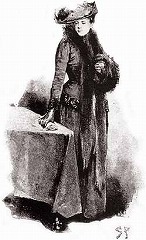“I shall glance into the case for you,” said Holmes, rising, “and I have no doubt that we shall reach some definite result. Let the weight of the matter rest upon me now, and do not let your mind dwell upon it further. Above all, try to let Mr. Hosmer Angel vanish from your memory, as he has done from your life.”
“Then you don’t think I’ll see him again?”
“I fear not.”
“Then what has happened to him?”
“You will leave that question in my hands. I should like an accurate description of him and any letters of his which you can spare.”
“I advertised for him in last Saturday’s Chronicle,” said she. “Here is the slip and here are four letters from him.”
“Thank you. And your address?”
“No. 31 Lyon Place, Camberwell.”
“Mr. Angel’s address you never had, I understand. Where is your father’s place of business?”
“He travels for Westhouse & Marbank, the great claret importers of Fenchurch Street.”
“Thank you. You have made your statement very clearly. You will leave the papers here, and remember the advice which I have given you. Let the whole incident be a sealed book, and do not allow it to affect your life.”
“You are very kind, Mr. Holmes, but I cannot do that. I shall be true to Hosmer. He shall find me ready when he comes back.”

For all the preposterous hat and the vacuous face, there was something noble in the simple faith of our visitor which compelled our respect. She laid her little bundle of papers upon the table and went her way, with a promise to come again whenever she might be summoned.
Sherlock Holmes sat silent for a few minutes with his finger-tips still pressed together, his legs stretched out in front of him, and his gaze directed upward to the ceiling. Then he took down from the rack the old and oily clay pipe, which was to him as a counsellor, and, having lit it, he leaned back in his chair, with the thick blue cloud-wreaths spinning up from him, and a look of infinite languor in his face.
“Quite an interesting study, that maiden,” he observed. “I found her more interesting than her little problem, which, by the way, is rather a trite one. You will find parallel cases, if you consult my index, in Andover in ’77, and there was something of the sort at The Hague last year. Old as is the idea, however, there were one or two details which were new to me. But the maiden herself was most instructive.”
“You appeared to read a good deal upon her which was quite invisible to me,” I remarked.
“Not invisible but unnoticed, Watson. You did not know where to look, and so you missed all that was important. I can never bring you to realize the importance of sleeves, the suggestiveness of thumb-nails, or the great issues that may hang from a boot-lace. Now, what did you gather from that woman’s appearance? Describe it.”
“Well, she had a slate-coloured, broad-brimmed straw hat, with a feather of a brickish red. Her jacket was black, with black beads sewn upon it, and a fringe of little black jet ornaments. Her dress was brown, rather darker than coffee colour, with a little purple plush at the neck and sleeves. Her gloves were grayish and were worn through at the right forefinger. Her boots I didn’t observe. She had small round, hanging gold earrings, and a general air of being fairly well-to-do in a vulgar, comfortable, easy-going way.”
Sherlock Holmes clapped his hands softly together and chuckled.